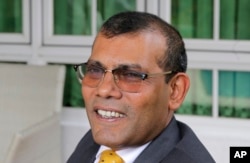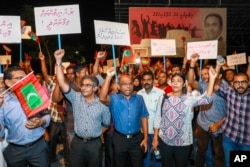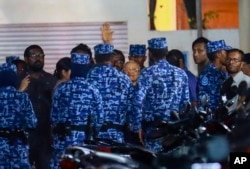The declaration of a state of emergency in the Maldives and arrest of two senior judges prompted a exiled former president to ask India on Tuesday to send an envoy backed by military to free political prisoners on the tiny Indian Ocean archipelago.
Here's background information on the crisis engulfing the overwhelmingly Muslim nation of 400,000 people, whose faraway islands are best known as a luxury holiday destination.
Key figures
President Abdulla Yameen declared the state of emergency February 5. He defied a shock ruling from the Supreme Court that quashed convictions ranging from terrorism to corruption and ordered the release of nine leading opposition figures, on the ground that the cases against them were politically tainted.
Yameen came to power in 2013 after winning an election the opposition said was rigged. Critics accuse his government of imprisoning opponents, curbing free speech and pressuring the judiciary.
His rival Mohamed Nasheed became the Maldives' first democratically elected president in 2009, but he was forced to resign amid a mutiny by police in 2012. After losing the election to Yameen the following year, Nasheed was sentenced to 13 years in prison in 2015 on charges that he said had been concocted by Yameen's government.
Allowed to leave jail to seek medical treatment abroad, Nasheed was granted asylum by Britain in 2016. He has said he wants to contest a presidential election due later this year, and was in Colombo when the Supreme Court decision precipitated the crisis. After Yameen declared a 15-day emergency on Tuesday, Nasheed called on India, the main regional power, to intervene.
Nasheed, a graduate of Britain's Liverpool University, is well connected in the West and has been able to bring pressure against Yameen's administration.
During his imprisonment, human rights lawyer Amal Clooney championed his cause and helped expose alleged human rights violations by Yameen's administration.
During his presidency, Nasheed had drawn world attention to the Maldives by conducting an underwater cabinet meeting, with the ministers wearing scuba diving suits, to highlight the dangers posed by global warming to low-lying island nations like his own.
Supreme Court ruling
While quashing the convictions against Nasheed and eight other opposition leaders, and ordering the release of those in detention, the court said that they should be retried.
It also ordered the reinstatement of 12 lawmakers who had been stripped of their parliamentary seats by Yameen's party for defecting last year. The removal was unconstitutional, the court said.
The reinstatement of the dozen legislators, who now belong to opposition parties, would cause Yameen's party to lose its majority in the 85-member assembly.
Should the opposition reach a majority, it would be able to unseat the speaker, who is a member of the ruling party, and pass no-confidence motions against government officials.
Yameen's response
Declaring the emergency, Yameen's office issued a statement saying the court order had disrupted functions of the executive and infringed national security and public interest. It also said the constitution could eventually be undermined if the court order was implemented.
The president's office said some rights have been restricted under the emergency and some laws suspended, though no curfew has been ordered. It gave assurances for the safety of Maldivians and foreigners.
Having imposed the state of emergency, Yameen ordered the arrest of the country's chief justice and another top judge, and security forces seized control of the Supreme Court.
In a televised address to the nation, Yameen said he had acted to prevent a coup and implied the judges had sided with his enemies as they were under investigation for corruption.
The president had earlier fired two police chiefs who said they would uphold the court order to release Yameen's opponents.
The army appears to be supporting Yameen. On Sunday, state television showed several police and soldiers saying they were ready to sacrifice their lives "in the defense of the lawful government."
Yameen's supporters have shut down an independent television station.
Nasheed's reaction
In a Twitter post, Nasheed asked India to send an envoy, backed by its military, to release the judges and political detainees. He also urged the United States to block financial transactions of Yameen's government.
New Delhi sent troops to the Maldives in 1988 to foil a coup, purportedly involving foreign mercenaries.
International reaction
The United States and India have urged Yameen to heed the court decision, but he has disregarded international calls to solve the crisis through dialogue.
China, which has boosted its investments in the Maldives, said the crisis should be settled internally.
The Maldives withdrew from the Commonwealth, the association of former British colonies and dominions, in 2016 after being threatened with suspension for failing to show progress on democracy.







